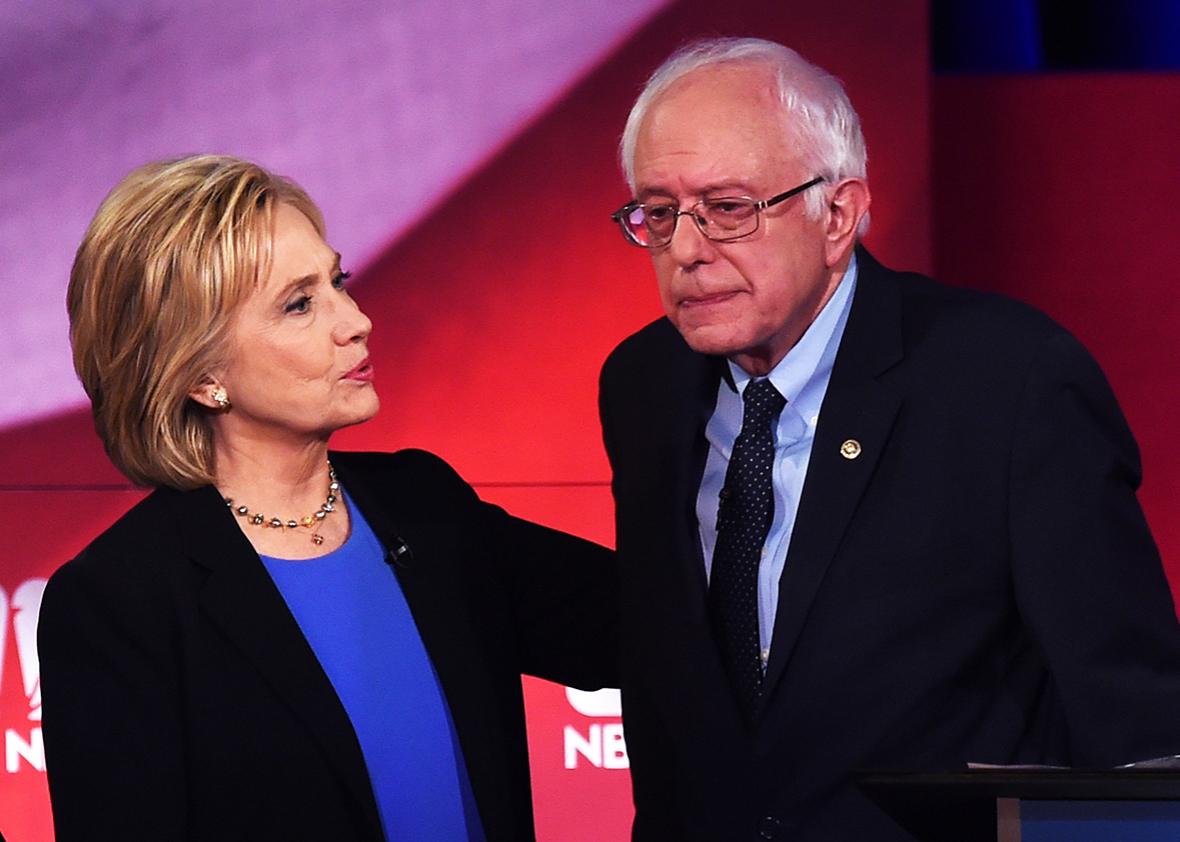Unlike debates, candidate forums aren’t the place for political combat. And at Monday’s Democratic forum—hosted by CNN at Drake University in Des Moines, Iowa—the three contenders stuck to their records, their judgment, and their experience when answering questions from the audience. At the same time, the candidates weren’t disarmed. They drew contrasts and highlighted differences among one another.
That, in essence, is what Sen. Bernie Sanders did with his time on the stage. In his closing argument to Iowa Democrats, he urged them to look at all the ways he has had superior judgment to that of his chief rival, Hillary Clinton. “The truth is that the most significant vote and issue regarding foreign policy that we have seen in this country in modern history was the vote on the war in Iraq,” he explained to the audience. “Hillary Clinton voted for the war in Iraq.”
He took the same approach on questions of financial regulation. “Wall Street has operated, in a very significant way, in a fraudulent way, and obviously their greed and recklessness helped destroy our economy and create the worst recession since the Great Depression,” he said. “I led the effort against Wall Street deregulation. See where Hillary Clinton was on this issue.”
It was a variation on the message that helped carry Barack Obama to victory in the Iowa caucuses. On the critical issues of the day, Sanders argued, Clinton was wrong. And while he doesn’t have the same experience as the former secretary of state, you can trust his judgment above hers.
This was an aggressive approach, but Sanders needed to be aggressive. At this stage, the Iowa caucus is a tossup. Clinton leads by an average of just 0.6 points, reflecting a deep divide in Iowa polling. In polls conducted from registered voter files, Clinton excels, with her highest support among older people and women—groups most likely to vote. But in polls conducted through random dialing, Sanders wins. As Nate Cohn notes for the New York Times, a recent poll “found Mrs. Clinton ahead by nine points among those who said they would ‘definitely’ vote, with Mr. Sanders ahead by 10 among those who said they would ‘probably’ caucus.” Sanders has less than a week to convert his likely supporters into definite supporters, and throwing a few elbows—clarifying the differences between himself and his chief opponent—is part of that approach.
Clinton has the reverse problem. She needs to hold on to her nominal lead. Earlier in the month, Team Clinton approached this through attacks on Sanders for his health care plan and “democratic socialist” identification. But, as evidenced by the forum, Clinton has moved away from that tactic. Instead, she’s going for persusasion, presenting herself as best equipped to accomplish progressive goals without attacking Sanders or alienating his supporters.
“You know, you can say all the kinds of things you want in a campaign,” said Clinton, “And we are drawing distinctions with the Republicans, and we should because I have very deep disagreements, as I just pointed out, with a lot of what they’re saying and doing.” But, she continued, “Once the election is over we must come together to work to solve the problems facing our country. That is what I did. I did it as a First Lady when I worked, as I said, to get the children’s health insurance program. I did it to reform the foster care and adoption system with one of the most partisan Republicans in the house, Tom DeLay. I did it when I was in the Senate.”
Continuing this kinder, gentler approach, Clinton applauded Sanders for engaging young people in the election (following a question from a Sanders supporter, asking why she’s “dishonest”). “I’m totally happy to see young people involved in any way,” she said. “That’s what we want.” Likewise, in her final remarks, she praised one of Sanders’ closing advertisements as the kind of “prose” that is important for energizing the country. “You know, look, you campaign in poetry, you govern in prose,” said Clinton, paraphrasing former New York Gov. Mario Cuomo. “And we need a lot more poetry in this campaign and in our country. So, I applaud that. I love the feeling. I love the energy.”
When thinking of where both candidates stand and how this contest in Iowa might end, it’s worth watching their closing advertisements to caucusgoers. Clinton focuses on herself as a “fighter” for the interests of ordinary people. It’s a frame that emphasizes competence and experience—her main selling points. Sanders has a different goal. He wants you to imagine a better America. “There are those who say we cannot defeat a corrupt political system and fix a rigged economy,” he says. “But I believe we need to lift our vision above the obstacles in place—and look to the American horizon.” Sanders is focused on his vision—his “political revolution.” It’s movement-building, and it’s effective.
The key question to Iowans, six days before they caucus, is a familiar one, an echo of the 2008 contest that changed the face of American politics. Do they want a fighter for their interests or an inspiration for their dreams? Then, when Democrats were almost certain to win the White House and Congress with it, the answer was a little easier. Now, against an intractable Republican opposition, it’s far less clear.
